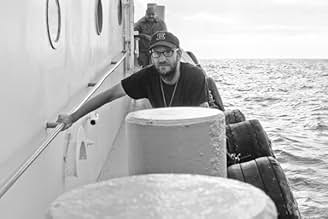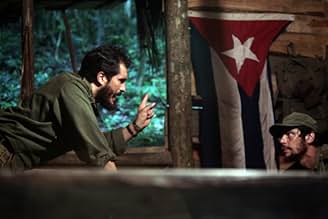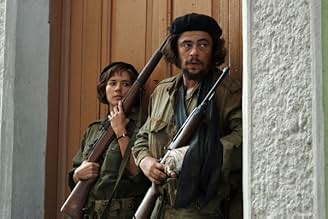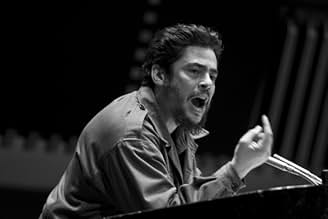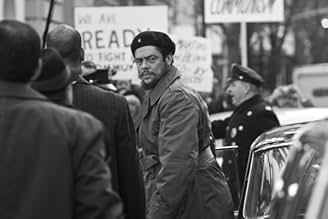1956 में, अर्नेस्टो 'चे' ग्वेरा और कास्त्रो के नेतृत्व वाले क्यूबा के निर्वासितों के एक दल ने तानाशाह फुलगेनसियो बतिस्ता के शासन को खत्म करने के लिए एक सेना जुटाई.1956 में, अर्नेस्टो 'चे' ग्वेरा और कास्त्रो के नेतृत्व वाले क्यूबा के निर्वासितों के एक दल ने तानाशाह फुलगेनसियो बतिस्ता के शासन को खत्म करने के लिए एक सेना जुटाई.1956 में, अर्नेस्टो 'चे' ग्वेरा और कास्त्रो के नेतृत्व वाले क्यूबा के निर्वासितों के एक दल ने तानाशाह फुलगेनसियो बतिस्ता के शासन को खत्म करने के लिए एक सेना जुटाई.
- निर्देशक
- लेखक
- स्टार
- पुरस्कार
- 4 जीत और कुल 13 नामांकन
- Interpreter
- (as Óscar Isaac)
- María Antonia
- (as María Isabel Díaz)
- Fidel Castro
- (as Demian Bichir)
- Héctor
- (as Ramón Fernández)
- Alejandro Ramírez
- (as Yul Vázquez)
- Jorge Sotús
- (as Jsu García)
- Rebel Messenger #1
- (as Luis Rodríguez Sánchez)
- Juan Almeida
- (as Roberto Luis Santana)
फ़ीचर्ड समीक्षाएं
This is not the first time Che's story has been turned into a movie. The 2004 film, The Motorcycle Diaries, examines the formation of Guevara's early politicization, and But Soderberg's film (with Benicio Del Toro in the lead role as Che Guevara), is the first to try and tell the whole story of Guevara's involvement in the Cuban revolution, and his subsequent attempt to spread the revolution to Boliva, where he was eventually caught and killed in October 1967.
Part 1, deals with the fight against Batista. The long hard slog of waging a guerrilla campaign is covered in great detail as a boatload of 82 revolutionaries head for Cuba during November 1956, and the struggle to win Cuba back for the Cuban people begins.
The first film draws extensively on the Guevara's own writings, especially his memoir "Reminiscences of the Cuban Revolutionary War". The months and years of protracted guerrilla warfare are inter-cut with beautifully recreated scenes showing Che addressing the United Nations in 1964, and conducting numerous interviews with a range of media outlets.
Soderberg uses these scenes to explain some of the history and 'back story' to the Cuban revolution, and to give the audience some insight into Che Guevara the man and revolutionary. Part 1 of Che ends in 1959 as Batista flies into exile in the United States, and the revolutionaries under the leadership of Fidel Castro and Che Guevara are about to enter Havana.
Drawing on Guevara's 'Bolivian Diary', Part 2 of Che takes up the story as Che, going under the pseudonym of 'Ramon', lands in Boliva in 1965, and begins trying to recruit local guerrilla's with the intention of overthrowing the ruling government.
Here, his campaign to recruit local peasant farmers fails, and before he and his small band of revolutionaries are able to launch any sort of major anti government attack, they are hunted down and killed with the help of the Central Intelligence Agency.
Che Guevara was wounded and captured on or about October 9, 1967. It is a matter of record that he was alive at the time of his capture, and that he was subsequently shot and killed to ensure he would no longer be able to foment revolution either in Boliva or elsewhere in Latin America. How ironic then that his execution has sparked a 'cult of the revolutionary' that has not diminished over the intervening 40 plus years since his death.
Of course, apart from the Oceans series of films, Soderberg has shown he is socially aware by also directing Erin Brockovich, Traffic (again with Del Toro), and The Good German, so maybe we shouldn't be surprised that he decided to tackle the story of Ernesto 'Che' Guevara.
Don't be fooled by the inclusion of other A-list cast members (Julia Ormond, Matt Damon, Franka Potente, and Lou Diamond Phillips) in Che. All of these actors have minor roles, and small support parts. In fact Matt Damon is on screen for less than two minutes! I can only assume that Soderberg needed some additional well known actors to help secure finance and distribution for the film.
However, this is without a doubt Benicio Del Toros' film. His performance is a revelation. He inhabits the role of Guevara so well, that there are times when I wasn't sure if the historical footage recreated in black and white didn't have the real Che Guevara in them.
According to the program notes, Soderberg is working an a middle part to Che's story. This film will apparently cover Guevara's experiences in Africa. If this is the case, then this trilogy will indeed constitute Steven Soderberg's masterpiece. I can think of no other biopic to rival it, and the finished series should help to keep the legend of 'Che' Guevara alive for at least another 40 years.
If this means that we may not get exactly a fully rounded portrait of its titular protagonist/hero, then that's probably the only real liability that the picture has. Maybe, perhaps, rightfully so; Che wasn't a guy, at least in his prime revolutionary years, to be one that had much warmth or moments of doubt (and if he had them, they were behind closed doors and out of any record of diaries). So what we get in Part 1, the conventional "Rise" of the character in the story, is the tale of how to do a revolution right- or rather, how to take over a government by military force, and it's Che as a man who pretty quickly becomes a natural leader, a stern taskmaster and also someone who "loves" as a revolutionary must, Che says.
It's gripping film-making nevertheless, with Soderbergh commanding the narrative wonderfully between a color-filmed part-digital-part-35mm Red-camera on the 1957-1959 events in Cuba and the 1964 trip to the UN in New York filmed in grainy black and white. What we get is part documentary and part bio-pic, words straight from the guerrilla's mouth, as it were, and the events that led up to the take-over (which serves as the climax of the picture) in Santa Clara, Cuba. Some of the elements, as noted, are conventional of just a war picture: we get the young kids (16 and 14) who will do anything to fight with Guevara and his group; we get the supposed love interest, only (thankfully) muted with only one scene with small talk; and we get the moments of enthusiasm, humor, camaraderie, and unlikely bravery in the heat of battle.
But most importantly we see Benicio del-Toro take command of this role like he does seemingly often but rarely with such force. In fact, he probably elevates this Che past some possible pit-falls (this project was actually his baby, as he serves as co-producer and developed the project for years), and makes him as human as he can be, using Che's health-tic (asthma) to its fullest, and reveling in going for broke as far as gusto and revelation go. For all of Soderbergh's command of the film-making style- most of all, for me, during the climactic battle where we get to see him awesomely direct a battle sequence- del-Toro, for any scene he's in, steals the show. If for nothing else, whatever your political stance or thoughts on Che, he's worth the admission. 8.5/10
This battle scene is filmed guerrilla warfare style in an urban environment, with short bursts of action followed by silence as soldiers move into newer/better positions. It all feels very tense and realistic, which makes a nice change to the shaky cam explosion fests that we're used to. This style works well throughout the rest of the film but swaps the city for the jungle.
The flash forward scenes where Che is interviewed and later addresses the United Nations, help to give the story, and Che, more depth and background, whilst giving us insights into his personality and ideology. Along with the battles, these scenes also help to break up the slower parts of the film.
Cinematography in the film is good and occasionally great, with some stunning shots of the Cuban landscape. The black and white scenes are also well shot, without feeling out of place.
On another positive note, Benicio Del Toro does an excellent job portraying Che. He is understated and believable as the man who wanted to change people's lives, focused on doing what he thought was right.
Unfortunately though, I had trouble caring about or even remembering most of the other characters, as dialogue between them isn't particular memorable. Sometimes you almost feel like you're watching a documentary that's trying to teach rather than entertain and this can start to wear, especially when you're reading subtitles. Che may also be shown in a better light than some would like, although honestly I feel the film is fairly accurate in its portrayal of the man and the history.
I'd definitely recommend this film to anyone interested in Che or the events in Cuba. Even if at times things do get a little slow, it's still a rewarding and informative experience.
Of course, the icon that I refer to is quite obviously Cuban revolutionist Ernesto 'Che' Guevara here played by Benicio Del Toro, a figure now embellished upon the memories of those with slightest interest in political history. If not, then you probably have his face on a t-shirt somewhere and you didn't know. Yet it doesn't matter how or why you know of Guevara before you view Che because Peter Buchman does a fine job of introducing you to him here. Plus, coupled with a performance that never begs for attention but instead simply plays the man he's supposed to be portraying with no overt padding, Del Toro goes a long way to giving Che the right amount of conviction that is needed to keep thing interesting and dynamic. Make no mistake, this is no dramatization of the man's life, so Del Toro never piles on the melodrama or anything to that degree to win over the audience, and this is reflected not only through the movie's ensemble of performances, but through the entire production itself.
Had the feature remained its original singular, five hour form however, a different opinion may have been garnered, but as it stands, the movie does well on its own merit. Part One, which details the initial struggle of the revolution of Cuba, is less about Guevara and more about his cause under the leadership of Fidel Castro. Granted, focus is shifted every now and again to set up part two's inevitable centralization upon Che himself, but for the most part, Part One remains more as a wide-angled view on the movement in which Guevara was part of. This shift in focus does well to once again distance the movie away from mere speculative entertainment and more towards the form of an educational informant. Yes, there are scenes that drag on and on, and generally some of these seem superfluous and dubious to the overall arc of the production, but for the most part, the script and direction remains coherent in its willingness to merely document rather than emote.
As a whole, Che's first half is an unassuming picture. At first glance, it isn't anything remotely special, and probably won't provide viewers with any degree of resonance if they are not interested in the man and his people's struggle beforehand, yet the same can be said for a number of similar features. Instead, I can only recommend this to those who are interested in the revolution and don't mind slow paced, attention-demanding material that does entertain from time to time, but only as a natural result of its historical importance. Again, those looking for a character piece similar to Stone's portrayal of George W. Bush last year would be wise to reevaluate their will to see Che; although titled after the man himself, and a biopic on a purely ostensible level, Che is more about his fight than the man himself. There are no real moments of personal insight here, no cathartic revelations or studies of psyche. No, instead the movie tells the facts as they were, straight from the horses mouth, and while they can sometimes work against the common desires of cinema goers' need for personal fulfillment, if digested objectively, can provide a strongly engaging, interesting and informative piece of historically significant art.
- A review by Jamie Robert Ward (http://www.invocus.net)
Don't get me wrong, there is nothing specifically wrong with this film. It portrays a fairly accurate (if, as I said, sanitised) picture of the March on Santa Clara and the victory of Castro's rebels. However much in the same way as the kind of perpetually running museum film that you can dip in and out of it is largely uninspiring and leaves you feeling quite detached. The problem is not the direction or the acting which does manage to transport you into the heart of a Civil War ravaged Cuba. It is the fact that we learn next to nothing about Cuba, Che himself or the goals of the revolutionaries. We learn nothing of why the Batista regime was so bad that people wanted to overthrow it. Which means that this simply stands alone as a war film where there are lots of explosions, lots of running around and some scenes of people celebrating in the streets. While I understand from reports that Che Part Two is rather different I think that nevertheless the slight blandness of Che Part One means that, though it looks good, it does feel like a rather wasted opportunity.
क्या आपको पता है
- ट्रिवियाFor his role, Benicio Del Toro spent seven years researching Guevara's life.
- गूफ़When the guerrilleros are in the Sierra Maestra, we can hear the coqui (Eleutherodactylus coqui) singing in the night. However, this small frog is endemic to Puerto Rico and the Virgin Islands, thus not possible to be heard in Cuba.
- भाव
Lisa Howard: What is the most important quality for a revolutionary to possess?
Ernesto Che Guevara: El amor.
Cuban Diplomat #1: [translating] Love.
Lisa Howard: Love?
Cuban Diplomat #1: Love of humanity... of justice and truth. A real revolutionary goes where he is needed.
- कनेक्शनFeatured in Así se hizo - Che El Argentino (2008)
- साउंडट्रैकBasura
Written and Performed by Mark A. Mangini (as Mark Mangini)
टॉप पसंद
विवरण
बॉक्स ऑफ़िस
- बजट
- $3,50,00,000(अनुमानित)
- US और कनाडा में सकल
- $7,48,555
- US और कनाडा में पहले सप्ताह में कुल कमाई
- $61,070
- 14 दिस॰ 2008
- दुनिया भर में सकल
- $3,42,09,066
- चलने की अवधि2 घंटे 14 मिनट
- रंग
- ध्वनि मिश्रण
- पक्ष अनुपात
- 2.39 : 1
इस पेज में योगदान दें


